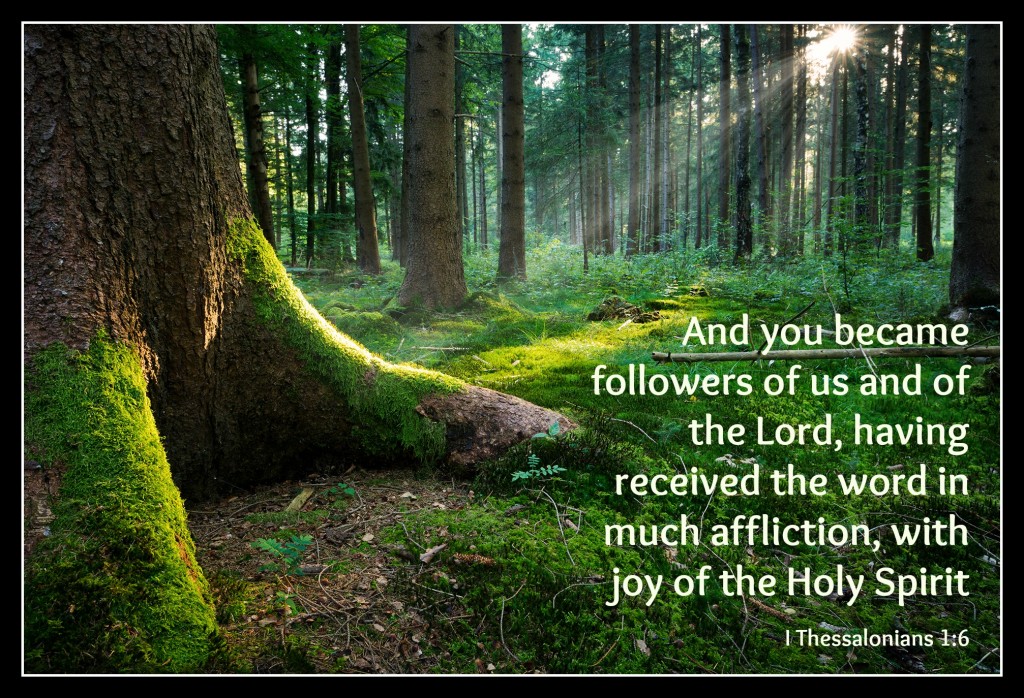 Okay, so by now you are probably getting tired of the joy theme. I am actually ready to move on to something else myself. But hang in with me for this. If I could pick one post for you to read about joy this entire month of January, it would be this one. It is, by far, the most concise and best thing I have read about joy. It is written by Andrew Murray in a book entitled The New Life: Words of God for Young Disciples of Christ. I hope you will be as challenged and blessed as I was by Rev. Murray’s words:
Okay, so by now you are probably getting tired of the joy theme. I am actually ready to move on to something else myself. But hang in with me for this. If I could pick one post for you to read about joy this entire month of January, it would be this one. It is, by far, the most concise and best thing I have read about joy. It is written by Andrew Murray in a book entitled The New Life: Words of God for Young Disciples of Christ. I hope you will be as challenged and blessed as I was by Rev. Murray’s words:
Chapter 32: Light and Joyfulness
‘Blessed is the people that know the joyful sound: they walk, O Lord, in the light of Thy Countenance. In Thy name do they rejoice all the day.’ — Psalm 89:15, 16
‘Light is sown for the righteous, and gladness for the upright in heart.’ — Psalm 47
‘I am the Light of the world: he that followeth me shall not walk in the darkness, but shall have the light of life.’ — John 8:12
‘I will see you again, and your heart shall rejoice, and your joy no one taketh away from you.’ — John 16:22
‘As sorrowful, yet always rejoicing.’ — 2Cor. 6:10
A father will always be eager to see his children joyful. He does all that he can to make them happy. Hence God also desires that His children should walk before Him in gladness of heart. He has promised them gladness: He will give it. (Psalm 89:16, 17; Isaiah 29; see John; 1Peter 1:8) He has commanded it: we must take it and walk in it at all times. (Psalm 32:1; Isaiah 12:5-6; 1Thessalonians 5:16; Phil. 4:4)
The reason of this is not difficult to find. Gladness is always the token that something really satisfies me and has great value for me. More than anything else is gladness for what I possess a recommendation of it to others. And gladness in God is the strongest proof that I have in God what satisfies and satiates me, that I do not serve Him with dread, or to be kept, but because He is my salvation. Gladness is the token of the truth and the worth of obedience, showing whether I have pleasure in the will of God. (Deut. 28:47; Psalm 40:9; Psalm 119:11) It is for this reason that joy in God is so acceptable to Him, so strengthening to believers themselves, and to all who are around the most eloquent testimony of what we think of God. (Neh. 8:11; Psalm 68:4; Proverbs 4:18)
In the Scriptures light and gladness are frequently connected with each other. (Esth. 8:16; Proverbs 13:9; Proverbs 15:30; Isaiah 60:20) It is so in nature. The joyful light of the morning awakens the birds to their song and gladdens the watchers who in the darkness have longed for the day. It is the light of God’s countenance that gives the Christian his gladness: in fellowship with his Lord, he can, and always will, be happy: the love of the Father shines like the sun upon His children. (Exodus 10:23; 2Samuel 23:4; Psalm 36:10; Isaiah 60:1, 20; 1John 1:5; 1John 4:16) When darkness comes over the soul, it is always through one of two things, through sin or through unbelief. Sin is darkness, and makes dark. And unbelief also makes dark, for it turns us from Him, who alone is the light.
The question is sometimes put, Can the Christian walk always in the light? The answer of our Lord is clear, ‘He that followeth Me shall not walk in darkness.’ It is sin, the turning from behind Jesus to our own way, that makes dark. But at the moment we confess sin, and have it cleansed in the blood, we are again in the light. (Joshua 7:13; Isaiah 58:10; Isaiah 59:1, 2, 9; Matthew 15:14, 15; 2Cor. 6:14; Ephes. 5:8, 14; 1Thes. 5:5; 1John 2:10) Or it is unbelief that makes dark. We look to ourselves and our strength; we would seek comfort in our own feeling, or our own works, and all becomes dark. As soon as we look to Jesus, to the fulness, to the perfect provision for our needs that is in Him, all is light. He says, ‘I am the Light: he that followeth me shall not walk in darkness, but shall have the light of life.’ So long as I believe, I have light and gladness. (John 12:36; John 11:40; Romans 15:13; 1Peter 1:8)
Christians, who would walk according to the will of the Lord, hear what His word says: ‘Finally, my brethren, rejoice in the Lord. Rejoice in the Lord always: again, I will say, Rejoice.’ (Phil. 3:1; Phil. 4:3) In the Lord Jesus there is joy unspeakable, and full of glory: believing in Him, rejoice in this. Live the life of faith: that life is salvation and glorious joy. A heart that gives itself undividedly to follow Jesus, that lives by faith in Him and His love, shall have light and gladness. Therefore, soul, only believe. Do not seek gladness; in that case you will not find it, because you are seeking feeling. But seek Jesus, follow Jesus, believe in Jesus, and gladness shall be added to you. ‘Not seeing, but believing, rejoice with joy unspeakable and full of glory.’
Lord Jesus, Thou are the Light of the world, the Effulgence (meaning radiance or brilliance) of the unapproachable light, in whom we see the light of God. From Thy countenance radiates upon us the illumination of the knowledge of the love and glory of God. And thou art ours, our light and our salvation. O teach us to believe more firmly that with Thee we can never walk in the darkness. Let gladness in Thee be the proof that Thou art all to us, and our strength to do all that Thou wouldst have us do. Amen.
- The gladness that I have in anything is the measure of its worth in my eyes: the gladness in a person, the measure of my pleasure in him: the gladness in a work the measure of my pleasure in it. Gladness in God and His service is one of the surest tokens of healthy spiritual life.
- Gladness is hindered by ignorance, when we do not rightly understand God and His love and the blessedness of His service: by unbelief, when we still seek something in our own strength or feeling: by double-heartedness, when we are not willing to give up and lay aside everything for Jesus.
- Understand this saying: ‘He that seeks gladness shall not find it; he that seeks the Lord and His will, shall find gladness unsought.’ Think over this. He that seeks gladness as a thing of feeling, seeks himself: he would fain be happy: he will not find it. He that forgets himself to live in the Lord and His will, shall be taught of himself to rejoice in the Lord. It is God, God Himself, who is the God of the gladness of our rejoicing: seek God, and you have gladness. You have then simply to take and enjoy it by faith.
- To thank much for what God is and does, to believe much in what God says and will do, is the way to abiding gladness.
- ‘The light of the eyes gladdens the heart.’ God has not intended that His children should walk in the darkness. Satan is the prince of the darkness: God is light: Christ is the Light of the world: we are children of the light: let us walk in the light. Let us believe in the promise, ‘The Lord shall be to thee an everlasting light. Thy sun shall no more go down, for the Lord shall be to thee an everlasting light, and the days of thy mourning shall be ended.
—The New Life: Words of God for Young Disciples of Christ by Andrew Murray
(This book, valuable for young and old disciples of Christ, is only .99 for Kindle and $7.49 for the hard copy. You can find it here.)
 Since my mother was a little girl she has been almost blind. She was quite unable to see or do much of anything without the aid of her eyeglasses. Somewhere during my childhood she got contact lenses and that made it more convenient. But the bottom line was that, unless she had some correction for her eyes, she only saw dark, undefined shapes.
Since my mother was a little girl she has been almost blind. She was quite unable to see or do much of anything without the aid of her eyeglasses. Somewhere during my childhood she got contact lenses and that made it more convenient. But the bottom line was that, unless she had some correction for her eyes, she only saw dark, undefined shapes.









